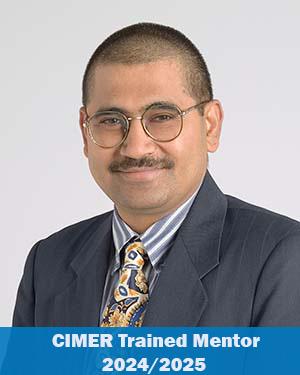Research News
02/24/2025
Heart Month 2025: Questions researchers are asking to improve heart health
Recent cardiovascular research at Cleveland Clinic examined topics such as the gut microbiome connection to the heart, COVID-19’s impact on cardiac event risk and improving cardiac imaging.

Cleveland Clinic scientists and clinicians are working together every day to discover new ways to guide and treat patients toward better cardiovascular health. That starts with asking big questions that can change our perspective on heart disease, its root causes and steps to prevent it.
In honor of Heart Month 2025, we’re highlighting scientists who are investigating heart health questions from repurposing therapeutics, to simulating heart disease using digital models.
How does the gut microbiome connect to heart health?

Wilson Tang, MD, a cardiologist and researcher, shares his unique insights about how his lab’s research on the relationship between the gut microbiome and the cardiovascular system provides a guidebook for his patient care in the exam room. He outlines what’s yet to discover about the gut microbiome’s effects on our overall health.
Are artificial sweeteners connected to increased blood clotting and cardiac disease risk?

The lab of Stanley Hazen, MD, PhD studies on artificial sweeteners erythritol and xylitol and found they aggravated blood platelets, which can cause blood clots and stroke. The erythritol study directly compared sugar’s effects on platelets and it did not have the same adverse effect as the artificial sweetener.
How does COVID-19 affect heart health in the long term?

The lasting effects of a COVID-19 infection continue to come to light – the Hazen lab found that contracting Covid doubles your risk of cardiac events like heart attack, stroke and even death, especially for patients with a non-O blood type (i.e. A, B or AB).
How can we stabilize a heart’s receptors to prevent heart failure?

Beta blockers are a common treatment for heart failure but are not a long-term solution. Sathyamangla Prasad, PhD is investigating a therapeutic to address beta-adrenergic receptor impairment, which would stabilize the entire process the body uses to keep blood flowing.
Is there a more effective way to treat pulmonary arterial hypertension?

Pulmonary arterial hypertension is a rare and deadly condition that kills 40% of patients within five years of diagnosis, mostly due to right heart failure. Gustavo Heresi, MD is conducting a clinical trial for the first PAH drug that would treat right heart failure.
What role can medication play in preventing atrial fibrillation?

Researchers are striving to determine new ways to find and treat the root cause of atrial fibrillation (AF) – the most common type of heart arrhythmia. Mina Chung, MD and David Van Wagoner, PhD share insight from their clinical trial investigating metformin and/or lifestyle and risk factor modification for AF prevention.
How can we advance cardiac imaging?

The imaging technology currently used to take and analyze pictures of our hearts has not changed in over 40 years. Christopher Nguyen, PhD discusses his ongoing work to advance the field with cardiac diffusion MRI and how it can benefit patient care and heart research.
Featured Experts
News Category
Related News
Want To Support Ground-Breaking Research at Cleveland Clinic?
Discover how you can help Cleveland Clinic save lives and continue to lead the transformation of healthcare.
Give to Cleveland Clinic






